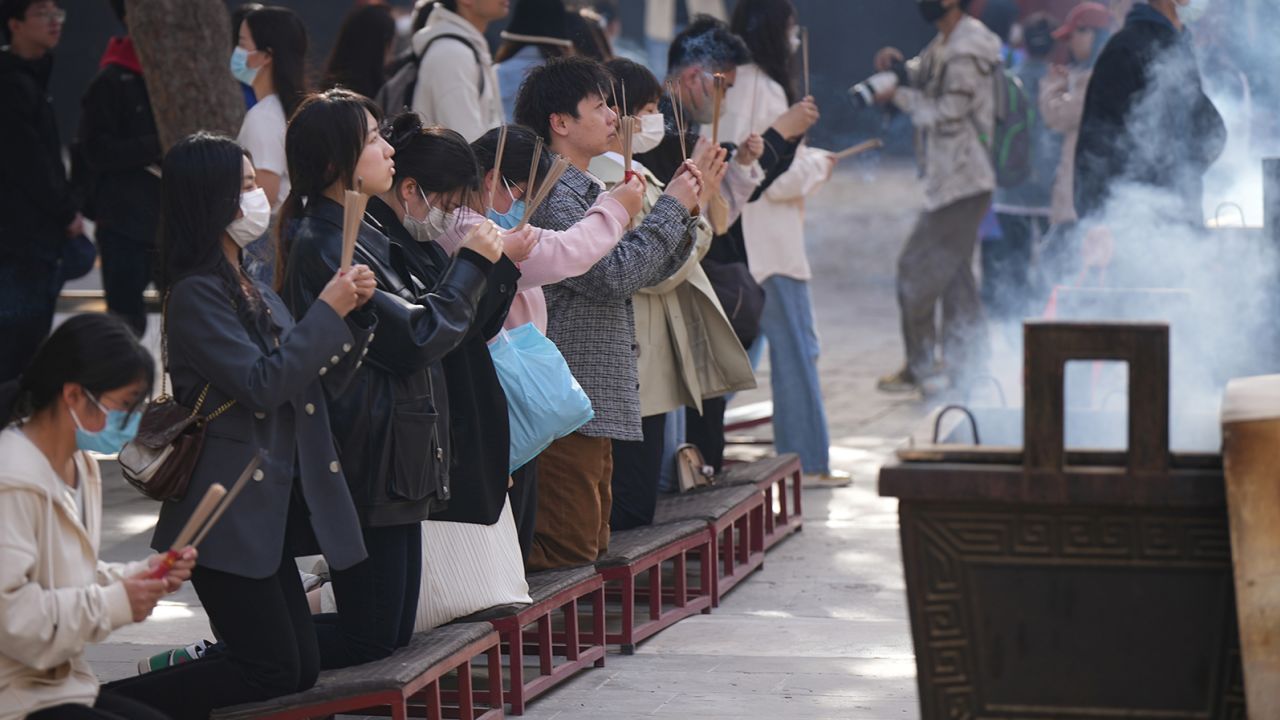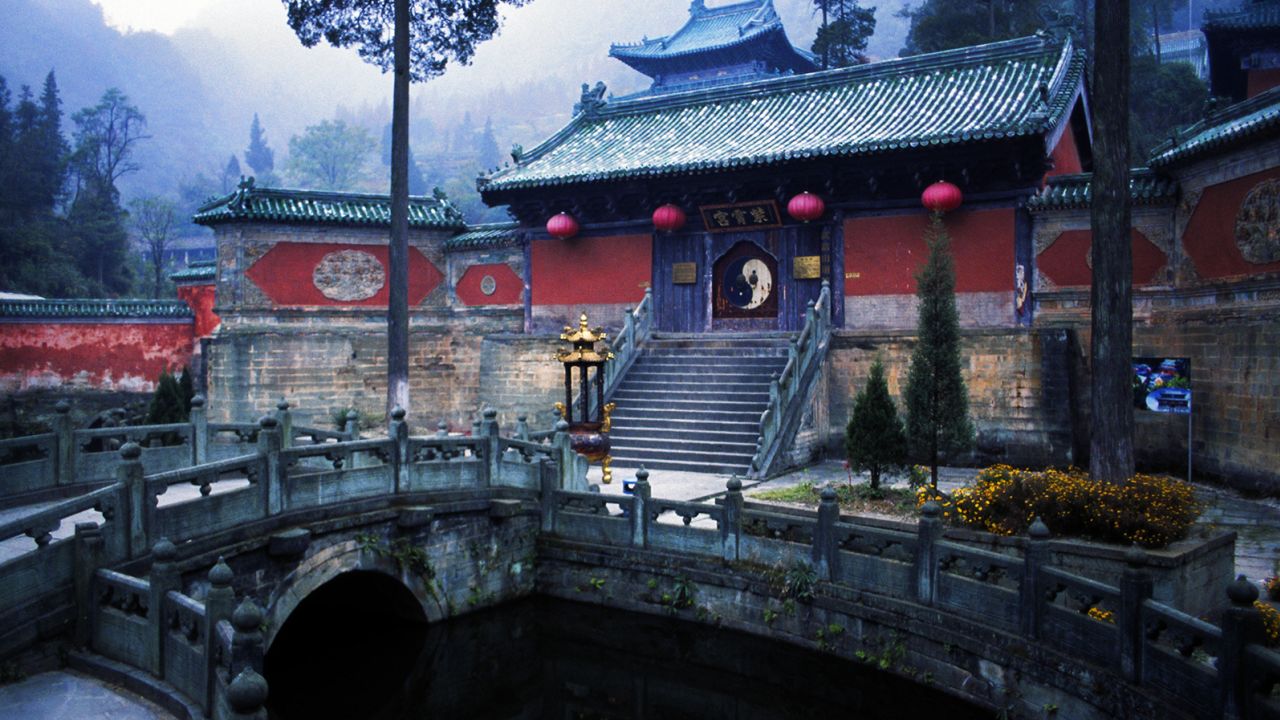Hong Kong CNN —
China’s post-Covid reopening was supposed to be the stimulant that the world needed. But after an early burst of activity, growth in the world’s second largest economy appears to be stalling.
Disillusioned by the deteriorating economic outlook, young people are flooding to Buddhist and Taoist temples to pray for divine intervention in securing jobs, getting into good schools or becoming rich overnight.
Data released this week showed Chinese exports fell 7.5% in May from a year ago, much more than expected, as global demand waned. Factory activity contracted again last month, and youth unemployment stands at a record high.
Economic uncertainty has driven temple visits and tourism to new heights, according to analysts and travel websites.
“No school-going, no hard-working, only incense-burning” has been a popular hashtag on social media since March, referring to a growing trend among young people in China who escape a pressure-cooker society by going to temples to pray for luck.
“Incense-burning youth” has become the number one catchphrase in China’s tourism industry this year, according to a survey jointly conducted in April by Qunar.com, a travel website, and Xiaohongshu, an Instagram-like app, which looked at the top travel trends.
The jobless rate for people between 16 and 24 years old reached a record 20.4% in April, according to official statistics.
The youth unemployment rate could get even worse as a record 11.6 million college students enter the already tough job market this summer, as the education ministry estimated earlier this year.
Different temples tend to attract different types of worshippers. The Yonghe Temple in Beijing, also known as the Lama Temple, which caters to the Tibetan Buddhism faith, is a popular site for those looking for career or financial success.

It recorded the biggest increase in visitors of any temple in the country in March and early April, up 530% from the same period last year, according to Qunar.
China is officially an atheist nation, but it recognizes five religions: Buddhism, Taoism, Protestantism, Catholicism and Islam. The first two religions are an essential part of Chinese culture, with tens of thousands of temples and monasteries across the country.
Temple visits have surged this year more than fourfold from a year ago, according to recent data from Qunar and Trip.com, another travel site. About half of the visitors are people in their 20s and 30s, according to the sites.
“Under pressure about school, jobs, marriage and relationships, more and more young people are turning to traditional culture, such as temple prayer and blessings, to relieve stress,” said Yang Yan, an analyst with Chinese brokerage firm Nanjing Securities.
Social media has also fueled the boom in temple tourism, as young people like to share their experiences on social networks, she added.
Emei and Jiuhua are two of China’s famous “four sacred mountains of Buddhism,” home to the country’s largest Buddhist temples and cultural heritage sites.
Emei Mountain in southwestern Sichuan province received 2.48 million visitors between January and May, up 53% from the same period in 2019, before any pandemic restrictions were imposed.
Emei Shan Tourism, which provides travel services around the mountain, has enjoyed soaring sales, posting a record $9.8 million in net profit in the first quarter, up 262% from the same period in 2019.
Its stock surged 44% over the past 10 trading sessions, becoming one of the best performers on Chinese stock markets during the period.
Anhui Jiuhuashan Tourism Development, which runs the Jiuhua Mountain scenic area in central Anhui province, also shattered quarterly sales records.
Its revenue for the January-to-March period jumped 43% from the same period in 2019 and was the highest since its 2015 listing. Its shares were up 34% over the past 10 trading sessions.
Taoist sites have also seen strong growth in worshippers.
Longhu Mountain in Jiangxi province, one of the birthplaces of Taoism, received 4.73 million visitors during the first quarter, up 47% from the same period in 2019.
Wudang, another famous Taoist site featured in the film “Crouching Tiger, Hidden Dragon,” recorded a 23% jump in visits for the January-to-March period compared with 2019.

Besides praying to deities for career success, supplicants are seeking luck in winning the lottery.
The Communist Party banned gambling in China when it took power in 1949. But the government runs two types of lotteries to raise money for sports events and welfare projects.
Lottery sales hit 50.33 billion yuan ($7.1 billion) in April, up 62% from a year ago, according to data released by the finance ministry in late May. That’s the highest sales for the month of April in a decade.
“It’s clearly a real-life placebo,” analysts at Hangzhou-based Caitong Securities wrote in a research report Sunday. In medical research, the placebo effect is the experience of feeling better after a dummy pill or treatment
During uncertain economic times, more people tend to seek solace in faith or other comforting activities such as buying lottery tickets, raising pets, attending concerts or spending time on hobbies such as anime or comics, the analysts said.
“The core attraction of buying lottery tickets is to bring people solace,” they added.


